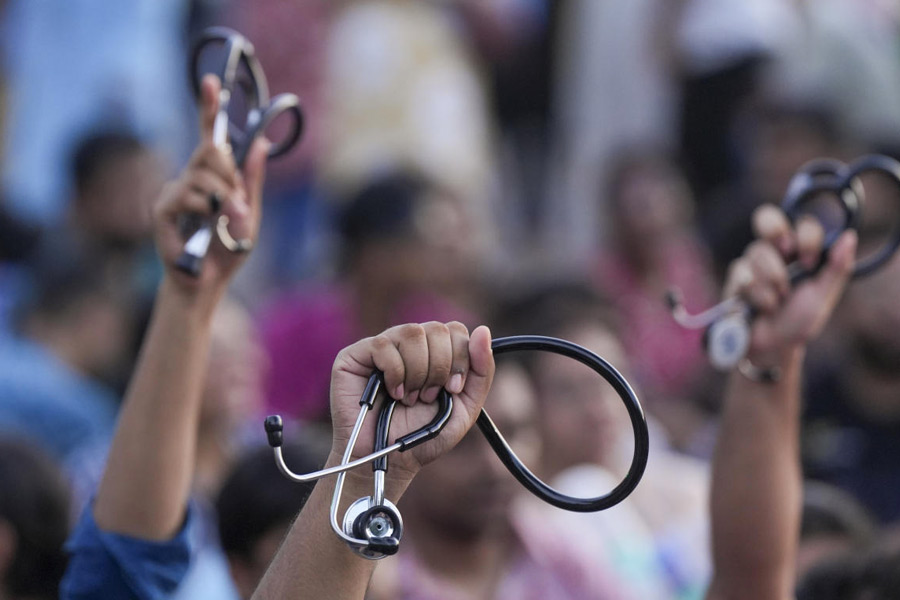One more junior doctor joined the six who have been on a fast till death at Esplanade since Saturday. Senior doctors, too, may join the protest.
While starting their fast unto death on Saturday night, one of the six junior doctors had indicated that more could join the fast later.
On Sunday night, Aniket Mahata, a postgraduate trainee at RG Kar Medical College and Hospital joined the fast.
The junior doctors started the fast after their 24-hour deadline to the state government to accept their 10 demands passed. The demands included the removal of the principal secretary in the health department and holding students’ union elections in medical colleges.
After the rape and murder of a 31-year-old postgraduate trainee doctor at RG Kar Medical College and Hospital on August 9, the junior doctors started a cease-work that continued for 42 days.
Ten days after resuming work they again started a cease-work on October 1.
The junior doctors rejoined work on Friday but threatened a fast unto death if their demands were not met.
On Sunday, the junior doctors wrote to Kolkata Police seeking permission to set up bio toilets near the protest venue, a stretch of Chowringhee Road opposite Metro cinema.
But the police did not respond to the plea till late on Sunday.
An officer of Kolkata Police told The Telegraph that they would not resort to any action against the junior doctors
who were occupying Chowringhee Road.
“The Supreme Court has asked the government to not take any action against the doctors. If we try to remove them, it will require use of some force and the doctors will then allege police excesses. We will wait and watch,” said the officer.
Senior doctors said on Sunday night they had in principle decided to start a hungerstrike but were yet to decide the timing and what form the protest would take — a fast unto death or a relay hunger strike.
“We will decide howmany senior doctors will join the protest,” said Tamonash Chowdhury, a member ofthe Joint Platform of Doctors, an umbrella organisationof several doctors’ associations.
The organisation said in a statement on Sunday that they “will be left with no other choice but to join the hunger strike in solidarity with our juniors”.
“Our junior sisters and brothers have called off their cease-work and have bravely undertaken a ‘fast till death’ in their unwavering quest for justice for Abhaya.
“In support of their fight, we call on all senior doctors, healthcare workers, and citizens to join the movement for justice,” the statement by the Joint Platform of Doctors read.
While announcing their decision on Saturday to start a fast unto death, the junior doctors said they would put up CCTV cameras around the protest venue so people could watch what was happening at the site.
The junior doctors did not say anything on Sunday about how people could see the footage of the cameras. A doctor told this newspaper they were planning to stream the recordings live on YouTube.
Sayantani Ghosh Hazra, one of the seven fasting doctors, said they were only drinking water. “We will not eat anything, only drink water,” she said.
A board with the names of the doctors on fast was put up at the site. The blood pressure and capillary blood sugar of each of the doctors was being written there at regular intervals. Junior doctors said those on fast were doing well till Sunday.
While the protest venue had only a few junior doctors in the morning, the numbers swelled from afternoon.
In the evening, there were more than 200 people — junior and senior doctors as well as others supporting the
cause.
A single file of vehicles could move through the stretch of the road that was kept open. The rest was occupied by the stage on which the doctors were fasting and the people who had gathered there to show solidarity with the protesters.
Sharmistha Sarkar, a central government employee from Tollygunge, was at the protest site in the afternoon. “The protest has triggered the feeling that we need to take to the streets when needed,” she said.
Nirmalya Chatterjee, 50, a state government employee from Naktala, was at the site for over four hours. He said he was there to stand by the doctors who showed exemplary courage in fighting a corrupt system.
Many people who came through the day were heard telling the junior doctors
that they were willing to offer any help the protesters needed.
A few people gave cheques and cash to the doctors to help sustain the movement.
The doctors issued them challans.











